| dc.contributor.author | Jesuit Centre for Theological Reflection | |
| dc.date.accessioned | 2023-03-01T09:49:06Z | |
| dc.date.available | 2023-03-01T09:49:06Z | |
| dc.date.issued | 2011-02-05 | |
| dc.identifier.uri | https://hdl.handle.net/20.500.14274/1717 | |
| dc.description | Nevertheless, JCTR encourages employers to pay wages proportionate to the cost of living in order to safeguard the well being of the workers and foster the rights and dignity of their families. Furthermore and as suggested before, JCTR encourages Government to at least index the minimum wage to inflation. This would enable a constant revision of the minimum wage and reduce onprotracted discussions among the Government, employers and trade unions such that by the time the revisions are made, the increase would be meaningless in relation to changes in the cost of living. | en |
| dc.description.abstract | Generally, the minimum wage serves the purpose of protecting low-wage workers. Raising the minimum wage creates ripple socio-economic effects as it has the immediate potential of reducing poverty as increased income boosts the purchasing power of the most vulnerable workers and encourages spending on basic needs. Other things being equal, this stimulates production to meet the increased demand and ultimately contribute towards economic development. “While the increase of the minimum wage was seemingly significant”, says Miniva Chibuye, Programme Manager for the Social Conditions Programme at the JCTR, “it is important to analyse
this in light of the cost of living using the JCTR’s Basic Needs Basket (BNB)”. The BNB is a tool that measures the average cost of basic food and essential non-food commodities for a Zambian average family of six in a specific town. In Lusaka, the BNB recorded a considerable increase from K2,897,430 in December 2010 to K3,019,100 in January 2011. The increase was attributed to the rise in the cost of some basic food commodities such as Kapenta, Dry fish, Meat, Beans and Vegetables. An upward adjustment in the essential non-food items such as water and sanitation from K114,530 to K210,000 in a medium density area also contributed to the increase. In fact, the total
BNB figure is likely to increase in subsequent months once the cost of housing is adjusted to reflect the current housing rentals. | en |
| dc.description.sponsorship | Irish Aid and Joint Country Programme | en |
| dc.language.iso | en | en |
| dc.rights | Attribution-ShareAlike 3.0 United States | * |
| dc.rights.uri | http://creativecommons.org/licenses/by-sa/3.0/us/ | * |
| dc.subject | Basic Needs and Nutrition Basket | en |
| dc.subject | Cost of Living | en |
| dc.subject | February 2011 | en |
| dc.title | February 2011 Basic Needs and Nutrition Basket: Will the Minimum Wage Increase the Purchasing Power for Employees? JCTR asks as the Lusaka BNB Reaches K3,000,000 | en |
| dc.type | Statement | en |

